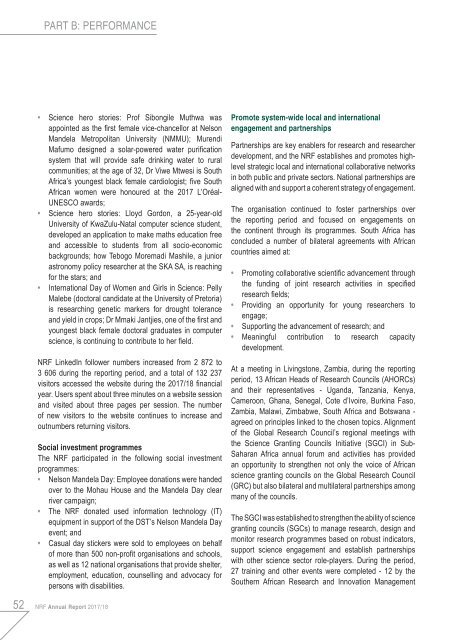NRF Annual Report 2018
You also want an ePaper? Increase the reach of your titles
YUMPU automatically turns print PDFs into web optimized ePapers that Google loves.
PART B: PERFORMANCE<br />
52<br />
• Science hero stories: Prof Sibongile Muthwa was<br />
appointed as the first female vice-chancellor at Nelson<br />
Mandela Metropolitan University (NMMU); Murendi<br />
Mafumo designed a solar-powered water purification<br />
system that will provide safe drinking water to rural<br />
communities; at the age of 32, Dr Viwe Mtwesi is South<br />
Africa’s youngest black female cardiologist; five South<br />
African women were honoured at the 2017 L’Oréal-<br />
UNESCO awards;<br />
• Science hero stories: Lloyd Gordon, a 25-year-old<br />
University of KwaZulu-Natal computer science student,<br />
developed an application to make maths education free<br />
and accessible to students from all socio-economic<br />
backgrounds; how Tebogo Moremadi Mashile, a junior<br />
astronomy policy researcher at the SKA SA, is reaching<br />
for the stars; and<br />
• International Day of Women and Girls in Science: Pelly<br />
Malebe (doctoral candidate at the University of Pretoria)<br />
is researching genetic markers for drought tolerance<br />
and yield in crops; Dr Mmaki Jantjies, one of the first and<br />
youngest black female doctoral graduates in computer<br />
science, is continuing to contribute to her field.<br />
<strong>NRF</strong> LinkedIn follower numbers increased from 2 872 to<br />
3 606 during the reporting period, and a total of 132 237<br />
visitors accessed the website during the 2017/18 financial<br />
year. Users spent about three minutes on a website session<br />
and visited about three pages per session. The number<br />
of new visitors to the website continues to increase and<br />
outnumbers returning visitors.<br />
Social investment programmes<br />
The <strong>NRF</strong> participated in the following social investment<br />
programmes:<br />
• Nelson Mandela Day: Employee donations were handed<br />
over to the Mohau House and the Mandela Day clear<br />
river campaign;<br />
• The <strong>NRF</strong> donated used information technology (IT)<br />
equipment in support of the DST’s Nelson Mandela Day<br />
event; and<br />
• Casual day stickers were sold to employees on behalf<br />
of more than 500 non-profit organisations and schools,<br />
as well as 12 national organisations that provide shelter,<br />
employment, education, counselling and advocacy for<br />
persons with disabilities.<br />
<strong>NRF</strong> <strong>Annual</strong> <strong>Report</strong> 2017/18<br />
Promote system-wide local and international<br />
engagement and partnerships<br />
Partnerships are key enablers for research and researcher<br />
development, and the <strong>NRF</strong> establishes and promotes highlevel<br />
strategic local and international collaborative networks<br />
in both public and private sectors. National partnerships are<br />
aligned with and support a coherent strategy of engagement.<br />
The organisation continued to foster partnerships over<br />
the reporting period and focused on engagements on<br />
the continent through its programmes. South Africa has<br />
concluded a number of bilateral agreements with African<br />
countries aimed at:<br />
• Promoting collaborative scientific advancement through<br />
the funding of joint research activities in specified<br />
research fields;<br />
• Providing an opportunity for young researchers to<br />
engage;<br />
• Supporting the advancement of research; and<br />
• Meaningful contribution to research capacity<br />
development.<br />
At a meeting in Livingstone, Zambia, during the reporting<br />
period, 13 African Heads of Research Councils (AHORCs)<br />
and their representatives - Uganda, Tanzania, Kenya,<br />
Cameroon, Ghana, Senegal, Cote d’Ivoire, Burkina Faso,<br />
Zambia, Malawi, Zimbabwe, South Africa and Botswana -<br />
agreed on principles linked to the chosen topics. Alignment<br />
of the Global Research Council’s regional meetings with<br />
the Science Granting Councils Initiative (SGCI) in Sub-<br />
Saharan Africa annual forum and activities has provided<br />
an opportunity to strengthen not only the voice of African<br />
science granting councils on the Global Research Council<br />
(GRC) but also bilateral and multilateral partnerships among<br />
many of the councils.<br />
The SGCI was established to strengthen the ability of science<br />
granting councils (SGCs) to manage research, design and<br />
monitor research programmes based on robust indicators,<br />
support science engagement and establish partnerships<br />
with other science sector role-players. During the period,<br />
27 training and other events were completed - 12 by the<br />
Southern African Research and Innovation Management


